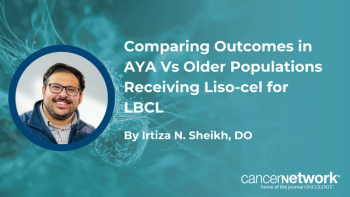
Obinutuzumab Delays Progression in Advanced Follicular Lymphoma
Treatment with obinutuzumab along with chemotherapy resulted in longer progression-free survival than rituximab and chemotherapy in patients with previously untreated advanced-stage follicular lymphoma, according to a large randomized trial.
Treatment with obinutuzumab along with chemotherapy resulted in longer progression-free survival than rituximab and chemotherapy in patients with previously untreated advanced-stage follicular lymphoma, according to a large randomized trial.
“The combination of the anti-CD20 monoclonal antibody rituximab with chemotherapy has significantly improved outcomes in patients with newly diagnosed follicular lymphoma,” wrote study authors led by Robert Marcus, MD, of King’s College Hospital in London. Obinutuzumab is also an anti-CD20 monoclonal antibody, and it has been shown to have significant antitumor activity in other malignancies.
The GALLIUM trial included 1,202 patients with follicular lymphoma, randomized to undergo induction treatment with either obinutuzumab-based chemotherapy (601 patients) or rituximab-based chemotherapy (601 patients). Patients who had a response to the therapy received maintenance treatment with the same antibody as they received for induction for up to 2 years. Results were
Patients were followed for a median of 34.5 months. At a planned interim analysis, obinutuzumab showed a significantly lower risk of progression, relapse, or death. The 3-year rate of progression-free survival was 80% with obinutuzumab, and 73.3% with rituximab, and the hazard ratio (HR) for progression, relapse, or death was 0.66 (95% CI, 0.51–0.85; P = .001).
There were 35 deaths in the obinutuzumab group, compared with 46 in the rituximab group, resulting in an HR for death of 0.75 (95% CI, 0.49–1.17; P = .21). Response rates were similar at the end of the induction phase, at 88.5% with obinutuzumab and 86.9% with rituximab (P = .33). Event-free survival was better with obinutuzumab, with an HR of 0.65 (95% CI, 0.51–0.83; P < .001).
Adverse events of grade 3 to 5 were more common with obinutuzumab therapy, at 74.6% compared with 67.8%. Serious adverse events (AEs) were also more common, occurring in 46.1% and 39.9% of patients, respectively; 4% of obinutuzumab patients and 3.4% of rituximab patients experienced an AE resulting in death. Infusion-related events were most common, occurring in 59.3% of obinutuzumab patients and in 48.9% of rituximab patients.
“The results of this large collaborative trial show that the replacement of rituximab with obinutuzumab in the context of immunochemotherapy and maintenance therapy in patients with previously untreated follicular lymphoma resulted in significantly longer progression-free survival,” the authors concluded.
Newsletter
Stay up to date on recent advances in the multidisciplinary approach to cancer.
Related Content


MCL Workshop Proves Essential for Moving the Needle Forward in Research












































